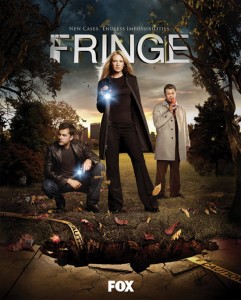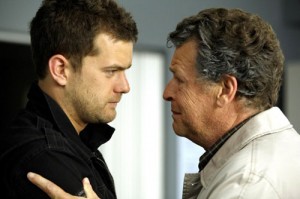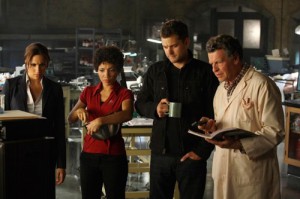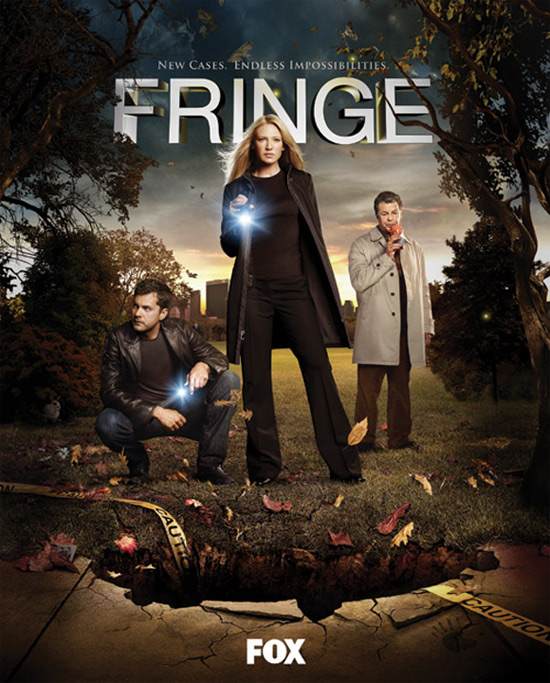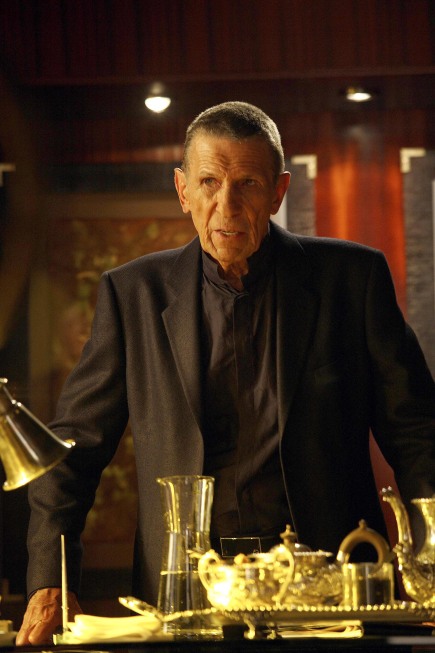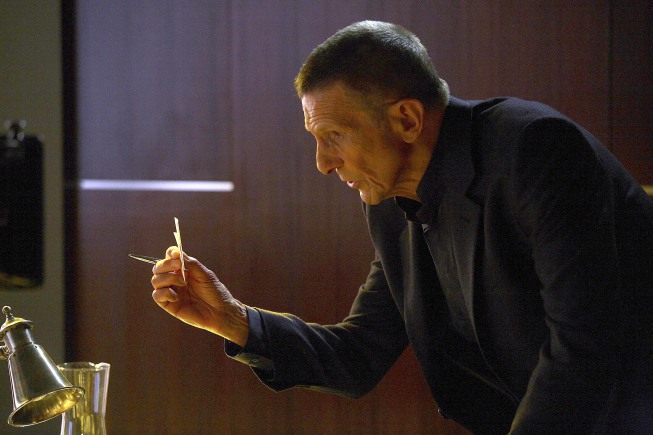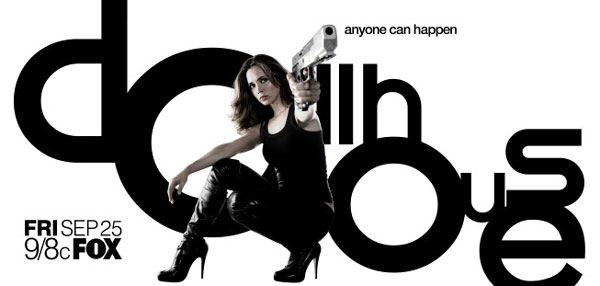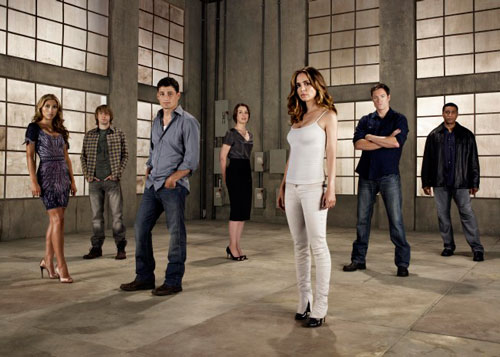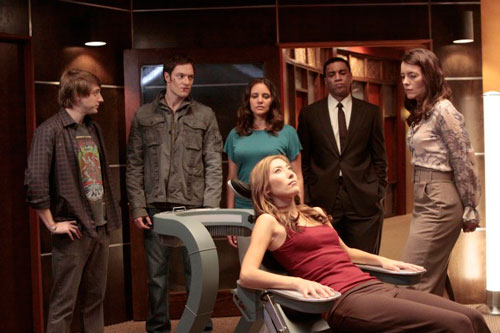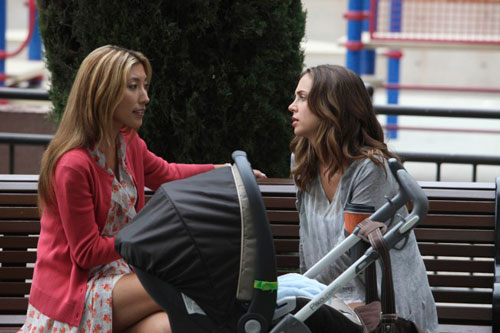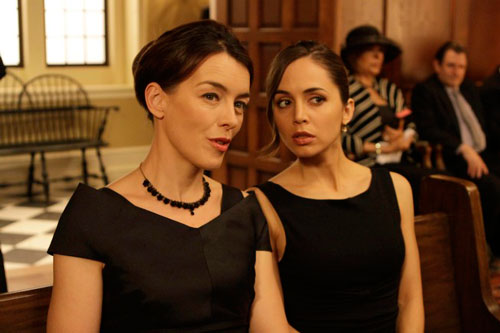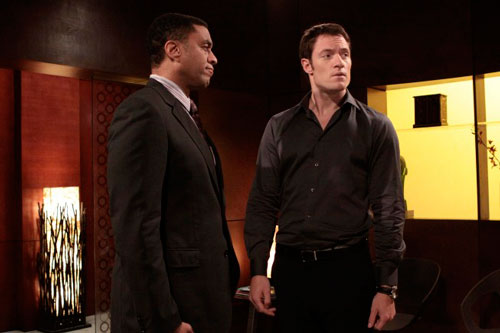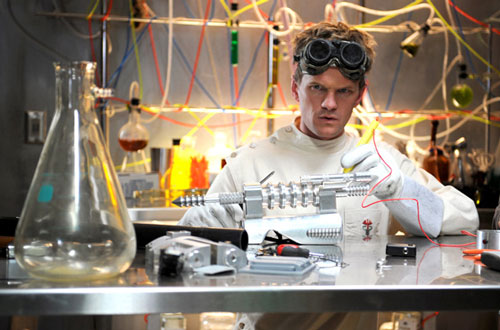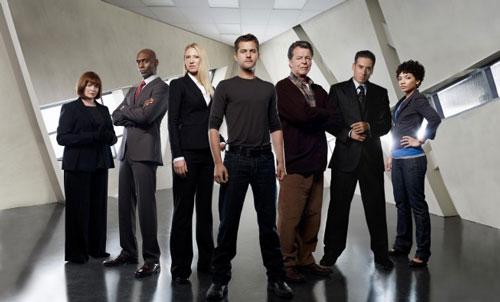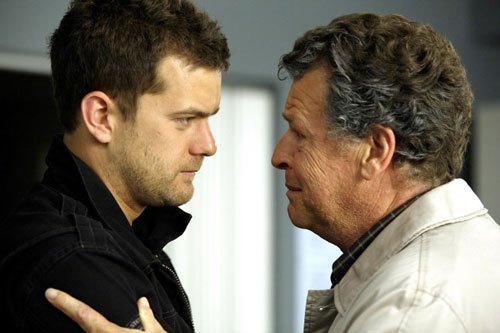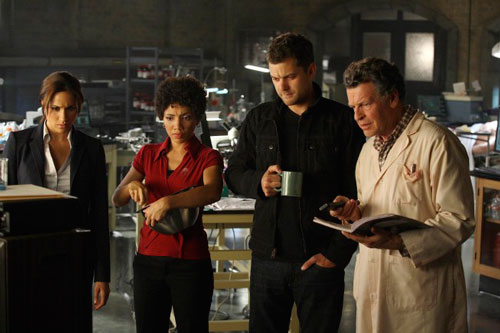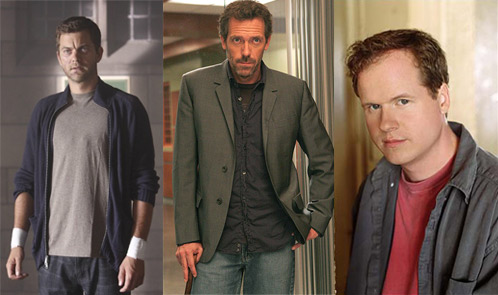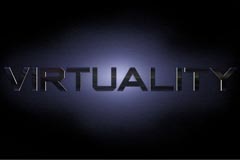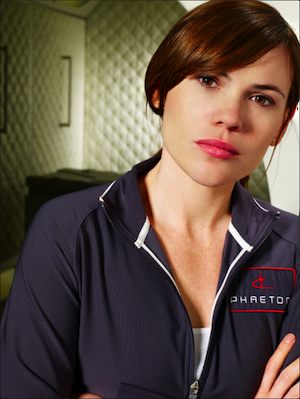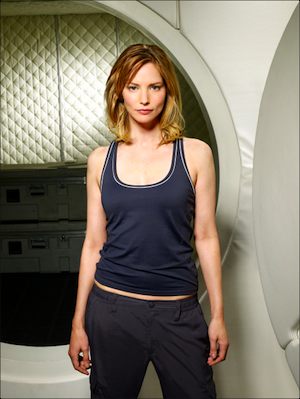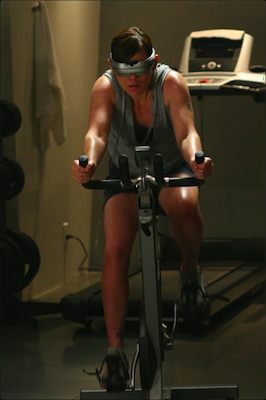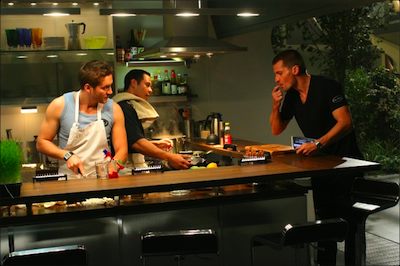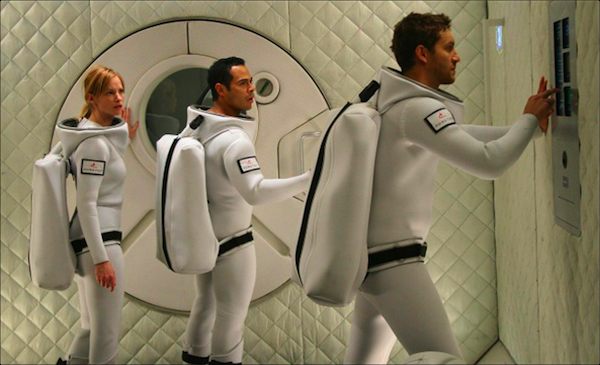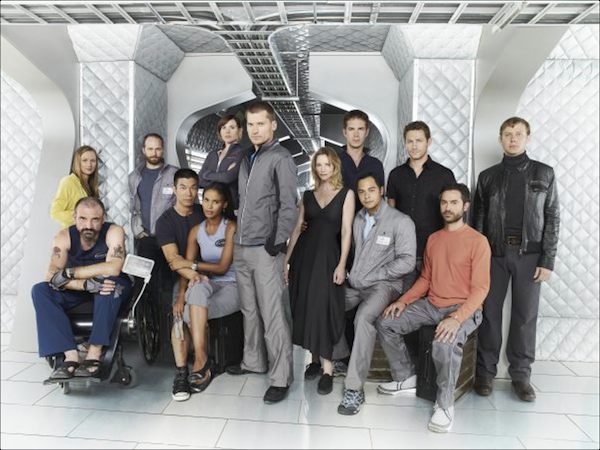Interview: John Noble (Walter Bishop) from Fringe [Part 2]
So have you all seen the latest Fringe episode ‘Peter’? Awesome, right? In this second part of the conference call from last week, John Noble answers questions about this episode and what’s in store for the future.
Beware Spoilers: there are spoilers in here for last week’s US episode ‘Peter’, and some stuff about the next couple of episodes (although most seemed pretty obvious to me especially after watching the ‘Peter’ episode).
Q: Obviously they keep you in the loop somewhat, but was there anything in the script that truly surprised you, any elements of the story?
A: The ultimate reveal, I think, and which is so critical to this episode of ‘Peter’, that Walter really did intend to take the child back, that he only went over because Walternate had missed the cure. That was a surprise, and a wonderful surprise to me because I hadn’t realized that he had only gone across there because he had to, because otherwise the boy would die. That was a major reveal to me, and I think it adds a whole new light to the relationship between Peter and Elizabeth and Walter going forward.
Q: And to follow up, I am just curious, is there any particular time-table in place for when Peter himself will find out the whole story?
A: Oh, certainly. We have this fabulous eight [episodes] coming out and during the course of that, there will be a build-over of several of those episodes to Peter finding out. Then, in fact, he does in turn find out, and that really dictates what happens in the last few episodes.
Q: How does this ‘Peter’ episode lead us up to any surprises that might be coming in the season finale?
A: Well, as I said, it lets us know what has happened, why Peter is where he is, and it also tells us specifically how Walter went to get him. So we see how he crossed over into the other universe. And so then, but of course once that has happened, we already know from the episode before that Olivia knows that he is from somewhere else. So there is this build-up towards Peter finding out, which is strangulating. I mean, the tension is enormous because Peter doesn’t know, Olivia does know, and she is pushing Walter to tell him. But then finally, he finds out and we tumble, we literally tumble into these extraordinary last two or three episodes, particularly the finale, which is the great promise confrontation that we have been promising for two years.
But a while before that is exceptional in the sense that it is like a mind-trip of Walter’s, and that is when we go into this musical episode that has been talked about. It is Walter trying to grapple with the fact that his son is gone, he doesn’t know where he is at that point. So we have this mind-trip of Walter’s which is an amazing episode, to be honest with you, all sorts of things, we have Peter away from them trying to cope by himself. All the things that people have been asking for, I think we are delivering in this final eight.
Q: It sure sounds like it, and since you guys have a third season coming, do you have any idea what is in store for that?
A: You know, I did ask the show runner. I said, “Have you got a bible ready for next year?” And he just pointed to his head and said “It is all in here, John, it is all in here.” I do know that there will be substantial time spent on the other universe, and when you get to the finale you will see why we have to do that. So, we will have this whole other universe playing in with this, at least for the first third of the season. That is all I can tell you at this stage.
Q: I’ve got to ask you a little bit about your theater background. The musical episode, did you do a lot of musicals when you were in theater?
A: I did some in the early days. I certainly did some music theater, and I even dropped into a couple of operas in small-acting roles. Yes, not the highlight of it. It was very interesting. It was good fun to do.
Q: So in the musical episode do your other co-stars sing too, and are they singers actually?
A: I suggest that probably they are much better singers than me. Lance Reddick is a superb singer and musician. We realize now that Anna Torv has got a beautiful voice, and that is just the starting point, you know. Jasika Nicole is also from a musical background. So, it was quite a reveal to us how much talent there was within the company. As I said, I was certainly not the A-lister in that group of people.
Q: In the Peter episode, there was kind of a hint that Nina and Walter are sharing some kind of bond, possibly about Peter. Are we going to be exploring that bond a little bit more in the last eight episodes of the season?
A: That will remain unexplored. It’s been around the place for a long time. In fact, as long as we’ve been running, it’s been hinted at. It’s one of the strings we’re not going to answer in this particular sequence. It will be talked about again in this sequence coming up, but we won’t be revealing how it came about until next season.
Q: Have they told you anything about that? Are you in the dark as well?
A: I am in the dark as well. I do know that they have worked out what it is, but they didn’t tell us yet.
Q: The revelations about Peter being from the other side will obviously affect the relationships between everyone on the show. Can you tell us a little bit more about how it will affect the potential relationship between Peter and Olivia and how does it affect the relationship between Peter and Walter?
A: Well, look, obviously – I can remember the first time that I was telling my own son about the show and I said, you know, Walter takes a son from the other side, and my son looked at me and said, “Dad, there’s going to be one very angry father on the other side.” I mean, it was so obvious to him that we were creating a hornet’s nest, and that indeed, the son himself when he finds out, if he finds out, is going to be extremely wounded by this and outraged. When Peter finds out, he is extremely wounded and outraged and bewildered and humiliated and all of the things – having just finally found some trust in his life, and given a little bit of himself to these two people, he finds out that he has been duped yet again.
So Joshua Jackson plays this beautifully, actually, and we see him as this lost man really, who has lost this new family of his and is just in the wilderness really. We do see that for a couple of episodes. And as I say, I think Josh does it really beautifully. What’s going to happen, and it won’t happen this year necessarily, there will be a hint of it in the finale, is that a relationship will be rekindled between Peter and Walter. It will be different. But I think there’s sufficient richness and sufficient texture in what they have already to get them past this hurdle, that’s my belief, and similarly with Olivia. The relationship that’s been created over the, you know, the two seasons really, is stronger than – it will survive this breach of trust. It will. And I think there’s a fantastic relationship between Peter and Olivia. It’s not a love relationship in terms of a sexual romantic one; it’s far deeper than that. And I think the three of them are locked together in some sort of an interdependency and that will survive this terrific challenge.
Q: How much work went into creating the 1985 version of you? I mean, not just in terms of creating a younger physical appearance, but also in terms of making a character that has a very different set of life experiences.
A: Quite a lot, but in the sense in my preparation to find the Walter that we all know now, I had to go back to him right at the beginning to see where he came from. So that process was started before the pilot really, what was this man like before he deteriorated, so I was able to revisit that. Physically, of course, what I had to do was capture the energy, to capture the physicality of the man, the vocal physicality of the man, this was my task. I was aided enormously by my hair and makeup and special effects people here in terms of getting the overall, and indeed wardrobe helped a lot as well. And then we, the shot up through these beautiful lenses that we got a different feel to the episode than we would now. All of those elements work together, David, to create this version that you see in the episode.
Q: I don’t know whether you watched the finished episode yet, but the episode does have also a 1985-style opening music and title sequence, and it listed on screen things that would be Fringe science in ’85, you know, like personal computing and cloning, and DNA, profiling, genetic engineering, and laser surgery, and whatnot. My question is, don’t you find it remarkable that what was science-fiction one day can become science fact in the blink of an eye, that we live in a time of such huge leaps and scientific advances.
A: Well, sure, but I grew up as a child reading Jules Verne and it all seemed to be some mysterious other-worldly thing, and basically everything that he talked about has been revealed. So I think one of the great things about science-fiction is that it, it does in fact predict the way ahead, more often than not. And I love the things that have been discussed in science-fiction. Science fiction comics indeed have turned out to be the truth, 30 or 40, 50 years later, so it is really no surprise to me.
Q: I want to know, what it was like for you to go back to 1985.
A: Oh man. Look, yes, I remember ’85. I can remember exactly what I was doing in ’85. I was still working in the theater. I had just directed a very successful play, which was going to London. That was ’85 for me, but it seems like a lifetime ago. Our children were babies. Oh… I could reminisce. But ’85 was a year – was it the year before Chernobyl? I mean, it was an interesting time. We were in Britain at the time when Chernobyl blew up, you know, and that seems like history. But that was ’85 for us. Going back I didn’t actually find a great challenge. Physically you’re probably in better shape 25 years than you are now. But I was able to work pretty hard on that aspect of it myself.
Mentally, I think as you get older, you lose your arrogance, to be honest with you. I think at 21 you know everything and then little by little you lose it, or you realize you know very little. So I think we have a more compassionate, humane man now than we had 25 years ago, but he was a determined and brilliant man and he believed in himself entirely. He believed that could achieve things. He believed that he could save his son, and that’s the difference from this indecisive man we see now.
Q: So, I think we’ve glimpsed a bit of Walter’s dark side so far, like in the episode where you got that piece of your brain back. It was suddenly like he had that focus again. Is it really fun to play that version of Walter, the kind of more focused, slightly more ruthless version of Walter? Anyway, I guess that’s my question.
A: And it’s a terrific question. Yes, it was wonderful to go back and visit the man before he became this damaged creature that we know now. It was probably in some ways closer to myself than the Walter that we see now, and so in some ways it was quite comfortable to go back to that place. It was an easier ride than doing the Walter that you know and that the audiences know. It was kind of nice to have that to be able to play with that more youthful energy. But bear in mind, as we speak about this, that’s two versions of Walter, but you were also introduced to another briefly who will play a major part coming forward in the series, and that’s Walternate. So you’ve got three quite distinct versions of Walter to look at here. And at present, in fact, as I sit here talking to you, I walked away from the rehearsal room, and I’m playing Walternet this morning, who is quite different from Walter in many ways. So it is fun. It’s a great challenge, but it’s great fun.
Q: I wanted to know, if Olivia didn’t have this ability to see the alternate universes, do you think Walter would have told Peter the truth on his own?
A: Interesting question. I think inevitably the truth would have to have come out, simply because of the escalation of the events in the pattern that something has started which was created, which was caused by the fact that Walter breached the tissue between the fabrics to get young Peter out. So, eventually, he would have had to find out. But it was far more interesting for us to find out through this lead character of ours, this very strange and wondrous Olivia character. It was a much better, dramatic way for him to find out.
